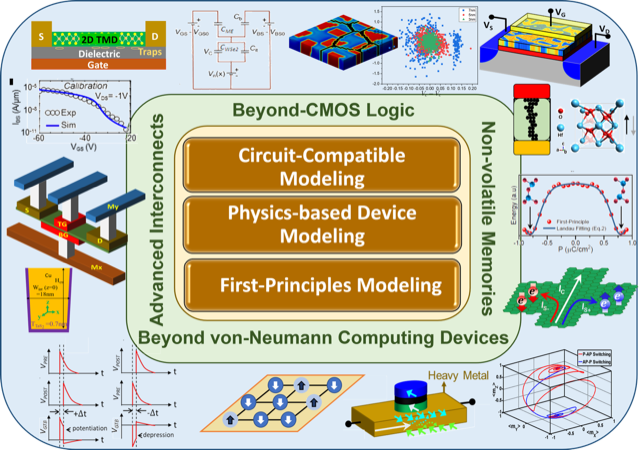IEEE Journal on Exploratory Solid-State Computational Devices and Circuits
Special Topic on “Physics-based modeling and simulation of materials, devices and circuits of beyond-CMOS logic and memory technologies for energy efficient computing.”

Guest Editors
- Sumeet K. Gupta, Purdue University, guptask@purdue.edu
- Editor-in-Chief Azad Naeemi, Georgia Institute of Technology, azad@gatech.edu
Aims and Scope
Standard Complementary Metal Oxide Semiconductor (CMOS) technology and its advanced flavors in the form of FinFETs have propelled the electronic industry to its extraordinary success. While the CMOS technology may continue to deliver its remarkably powerful performance to next-generation computing platforms, it is quite clear that in the longer term, it has major challenges in scaling, suffers from power consumption and power density limitations and may not be amenable to the new demands of the emerging applications. This will require beyond-CMOS technologies to step in and augment CMOS. Whether it is the design of energy efficient scalable switches for logic design, or non-volatile memory, or the integration of memory and logic functionalities for general-purpose computers and application-specific accelerators, the need for the application of quantum materials to realize these new microelectronic devices has surged.
To effectively utilize the unique and promising attributes of the emerging technologies, it is of paramount importance that their experimental discoveries and advancements are well supported by the understanding of the underlying physics and their implications at the materials, device, circuit, and system levels. To accelerate and achieve this, the modeling of novel materials and devices is expected to play a major role. On one hand, the models should provide important physical insights into the material properties and the device operation and scalability; on the other hand, they should enable efficient and accurate estimations of the performance and energy efficiency of the circuits based on the emerging technologies. Therefore, models at different levels of design abstraction will be needed as we tackle the challenges of finding revolutionary breakthroughs in computing and storage.
As a step towards addressing this grand challenge of developing advanced modeling and simulation frameworks for the exploration of beyond CMOS devices, the IEEE Journal on Exploratory Computational Devices and Circuits (JXCDC) aims to bring together important and impactful works in this area in a special topic focusing on various aspects of modeling and simulations of emerging materials, devices and circuits for standard and beyond-von-Neumann computing. The scope of this issue spans “First-Principles Modeling,” “Physics-based Modeling” and “Circuit-Compatible Modeling.” Topics of interest include but are not limited to:
- Modeling and simulations of emerging logic materials and devices such as:
- 1D and 2D materials
- Steep sub-threshold swing devices such as Tunneling FETs and Negative-capacitance transistors
- Spintronic devices
- Back-end of the line (BEOL) devices for 3D logic and memory
- Modeling and simulations of embedded non-volatile memories in logic
- Resistive RAMs
- Ferroelectric (FE) based memories (FE-transistors, FE-tunnel junctions etc.)
- Spin-based memories including memories based upon magneto-electric and valleytronics phenomena.
- Back-end of the line (BEOL) memories
- Modeling and simulations of advanced interconnects
- Modeling and simulation of beyond-von-Neumann computing primitives based on emerging materials and devices such as
- Artificial neurons and synapses for analog, spiking, oscillatory and other neural networks
- Stochastic and probabilistic computing primitives
- Cryogenic device modeling and simulations for logic and memory applications
- Variation and reliability modeling
Important Dates
- Open for Submission: 18 January 2023
- Submission Deadline: 18 April 2023
- First Notification: 18 May 2023
- Revision Submission: 2 June 2023
- Final Decision: 19 June 2023
- Online Special Topic Publication: 30 June 2023
JxCDC is an Open Access Only Publication
Article Processing Charge (APC): US$1950
For papers submitted in 2023, the APC is US$1950 plus applicable local taxes.
The following discounts apply:
- IEEE Members receive a 5% discount.
- IEEE (i.e. Computer) Society Members receive a 20% discount.
Discounts do not apply to undergraduate and graduate students. These discounts cannot be combined.
Submissions
Paper submissions must be done through the ScholarOne Manuscripts website: https://mc.manuscriptcentral.com/jxcdc. Guidelines for papers and supplementary materials, as well as a paper template, are provided on this website.
